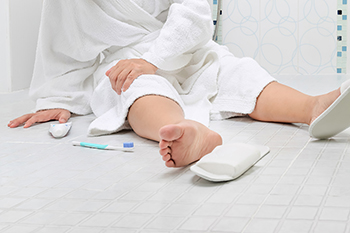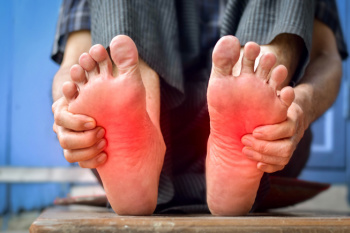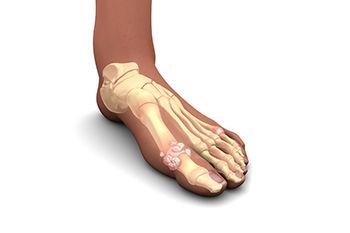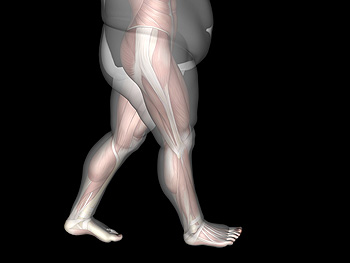Items filtered by date: August 2024
Falls Among the Elderly in Assisted Living Situations

Falls are a significant concern in assisted living facilities, particularly among the elderly. As people age, physical changes like muscle weakness, balance issues, and vision problems increase the likelihood of falls. Additionally, cognitive impairments, such as dementia, can lead to confusion and poor judgment, further raising the risk. Falls are prevalent in this population, often leading to serious physical injuries, such as fractures, and mental effects, like fear of falling, which can reduce mobility and independence. The environment in assisted living facilities, with unfamiliar layouts and communal living spaces, can also contribute to the risk of falls. Factors like wearing improper footwear, clutter, inadequate lighting, and lack of assistive devices play a role as well. If you or a loved one is living in an assisted living facility and have fallen and sustained a foot or ankle injury, or if you want to know more about preventing falls in this environment, it is suggested that you schedule regular appointments with a podiatrist for treatment and counsel.
Preventing falls among the elderly is very important. If you are older and have fallen or fear that you are prone to falling, consult with Ramin Nadjafi, DPM from Advanced Podiatry Group. Our doctor will assess your condition and provide you with quality advice and care.
Every 11 seconds, an elderly American is being treated in an emergency room for a fall related injury. Falls are the leading cause of head and hip injuries for those 65 and older. Due to decreases in strength, balance, senses, and lack of awareness, elderly persons are very susceptible to falling. Thankfully, there are a number of things older persons can do to prevent falls.
How to Prevent Falls
Some effective methods that older persons can do to prevent falls include:
- Enrolling in strength and balance exercise program to increase balance and strength
- Periodically having your sight and hearing checked
- Discuss any medications you have with a doctor to see if it increases the risk of falling
- Clearing the house of falling hazards and installing devices like grab bars and railings
- Utilizing a walker or cane
- Wearing shoes that provide good support and cushioning
- Talking to family members about falling and increasing awareness
Falling can be a traumatic and embarrassing experience for elderly persons; this can make them less willing to leave the house, and less willing to talk to someone about their fears of falling. Doing such things, however, will increase the likelihood of tripping or losing one’s balance. Knowing the causes of falling and how to prevent them is the best way to mitigate the risk of serious injury.
If you have any questions, please feel free to contact our office located in Orlando, FL . We offer the newest diagnostic and treatment technologies for all your foot care needs.
Are You Suffering From Nerve Damage?
Types and Sensations of Foot Arthritis

Foot arthritis can cause significant discomfort, affecting daily activities. It often feels like persistent pain, stiffness, and swelling in the joints of the feet. The three main types of foot arthritis are osteoarthritis, rheumatoid arthritis, and gout. Osteoarthritis involves the degeneration of cartilage, leading to pain and reduced mobility. Rheumatoid arthritis is an autoimmune condition that causes inflammation in the joints, resulting in swelling, pain, and deformity. Gout, caused by uric acid crystal deposits, leads to intense pain, particularly in the big toe, and sudden flare-ups. Symptoms across these types include joint stiffness, decreased range of motion, and discomfort during movement. If you have any of the above symptoms, it is suggested that you consult a podiatrist who can accurately diagnose foot arthritis, and offer effective relief options.
Arthritis can be a difficult condition to live with. If you are seeking treatment, contact Ramin Nadjafi, DPM from Advanced Podiatry Group. Our doctor can provide the care you need to keep you pain-free and on your feet.
Arthritic Foot Care
Arthritis is a term that is commonly used to describe joint pain. The condition itself can occur to anyone of any age, race, or gender, and there are over 100 types of it. Nevertheless, arthritis is more commonly found in women compared to men, and it is also more prevalent in those who are overweight. The causes of arthritis vary depending on which type of arthritis you have. Osteoarthritis for example, is often caused by injury, while rheumatoid arthritis is caused by a misdirected immune system.
Symptoms
- Swelling
- Pain
- Stiffness
- Decreased Range of Motion
Arthritic symptoms range in severity, and they may come and go. Some symptoms stay the same for several years but could potentially get worse with time. Severe cases of arthritis can prevent its sufferers from performing daily activities and make walking difficult.
Risk Factors
- Occupation – Occupations requiring repetitive knee movements have been linked to osteoarthritis
- Obesity – Excess weight can contribute to osteoarthritis development
- Infection – Microbial agents can infect the joints and trigger arthritis
- Joint Injuries – Damage to joints may lead to osteoarthritis
- Age – Risk increases with age
- Gender –Most types are more common in women
- Genetics – Arthritis can be hereditary
If you suspect your arthritis is affecting your feet, it is crucial that you see a podiatrist immediately. Your doctor will be able to address your specific case and help you decide which treatment method is best for you.
If you have any questions, please feel free to contact our office located in Orlando, FL . We offer the newest diagnostic and treatment technologies for all your foot care needs.
Facts About Managing Gout

Managing gout attacks involves a combination of lifestyle changes and medical treatments to reduce uric acid levels and prevent flare-ups. Gout, once known as a disease of kings due to its association with rich foods and alcohol, is now widespread, affecting over eight million US adults. The rise in cases is also linked to obesity and high blood pressure. Gout is caused by uric acid crystals in the joints, leading to intense pain, redness and swelling, commonly in the big toe. Prevention strategies include losing weight, avoiding alcohol and high-purine foods like red meat and seafood, and incorporating low-fat dairy into your diet. Medications to lower uric acid levels are often necessary and regular use of them can significantly reduce the frequency and severity of gout attacks. These measures can improve the quality of life and prevent long-term joint damage. If you have symptoms of gout, it is suggested that you schedule an appointment with a podiatrist for help in managing it effectively.
Gout is a painful condition that can be treated. If you are seeking treatment, contact Ramin Nadjafi, DPM from Advanced Podiatry Group. Our doctor will treat your foot and ankle needs.
What Is Gout?
Gout is a form of arthritis that is characterized by sudden, severe attacks of pain, redness, and tenderness in the joints. The condition usually affects the joint at the base of the big toe. A gout attack can occur at any random time, such as the middle of the night while you are asleep.
Symptoms
- Intense Joint Pain - Usually around the large joint of your big toe, and it most severe within the first four to twelve hours
- Lingering Discomfort - Joint discomfort may last from a few days to a few weeks
- Inflammation and Redness -Affected joints may become swollen, tender, warm and red
- Limited Range of Motion - May experience a decrease in joint mobility
Risk Factors
- Genetics - If family members have gout, you’re more likely to have it
- Medications - Diuretic medications can raise uric acid levels
- Gender/Age - Gout is more common in men until the age of 60. It is believed that estrogen protects women until that point
- Diet - Eating red meat and shellfish increases your risk
- Alcohol - Having more than two alcoholic drinks per day increases your risk
- Obesity - Obese people are at a higher risk for gout
Prior to visiting your podiatrist to receive treatment for gout, there are a few things you should do beforehand. If you have gout you should write down your symptoms--including when they started and how often you experience them, important medical information you may have, and any questions you may have. Writing down these three things will help your podiatrist in assessing your specific situation so that he or she may provide the best route of treatment for you.
If you have any questions, please feel free to contact our office located in Orlando, FL . We offer the newest diagnostic and treatment technologies for all your foot care needs.
Obesity and Foot Pain
 Obesity significantly impacts foot health, often leading to chronic foot pain due to the excessive weight exerting pressure on the feet. This added strain can result in conditions like plantar fasciitis, where the thick band of tissue running across the bottom of the foot becomes inflamed, causing intense heel pain. Additionally, the excess weight can contribute to flat feet, where the arches collapse, leading to further discomfort and instability. To manage foot pain associated with obesity, weight reduction through a balanced diet and regular exercise is important. Low-impact activities like swimming or cycling can help shed pounds without placing additional stress on the feet. Supportive footwear that provides adequate arch support and cushioning is also essential. If you carry excess weight and have persistent foot pain, it is suggested that you seek advice from a podiatrist. This medical professional can offer custom orthotics, recommend specific exercises to strengthen foot muscles, and provide guidance on managing foot health, ultimately enhancing mobility and quality of life.
Obesity significantly impacts foot health, often leading to chronic foot pain due to the excessive weight exerting pressure on the feet. This added strain can result in conditions like plantar fasciitis, where the thick band of tissue running across the bottom of the foot becomes inflamed, causing intense heel pain. Additionally, the excess weight can contribute to flat feet, where the arches collapse, leading to further discomfort and instability. To manage foot pain associated with obesity, weight reduction through a balanced diet and regular exercise is important. Low-impact activities like swimming or cycling can help shed pounds without placing additional stress on the feet. Supportive footwear that provides adequate arch support and cushioning is also essential. If you carry excess weight and have persistent foot pain, it is suggested that you seek advice from a podiatrist. This medical professional can offer custom orthotics, recommend specific exercises to strengthen foot muscles, and provide guidance on managing foot health, ultimately enhancing mobility and quality of life.
The more you weigh, the harder your feet must work to support your body. If you’re an obese individual and are concerned about your feet, contact Ramin Nadjafi, DPM from Advanced Podiatry Group. Our doctor can provide the care you need to keep you pain-free and on your feet.
Obesity and Your Feet
People who are overweight are putting more pressure on their ankles, knees, and hips as well as their feet. This unfortunately can lead to variety of different issues.
Problems & Complications Stemming from Obesity
- When the body is overweight, it tries to compensate by changing the way that it moves. An obese person may lean forward and put extra weight on the wrong part of the foot. This puts unnecessary stress on the feet.
- Obese people are also more likely to develop type II diabetes which is a condition that causes a lot of foot problems. People with diabetes often don’t feel the cuts and sores that they may have on their feet, which can lead to more complicated and severe issues.
- Plantar fasciitis is another foot condition that can be caused by obesity. Plantar fasciitis is an inflammation of the tissue along the bottom of the foot, which causes pain and stiffness while walking and climbing stairs.
If you have any questions, please feel free to contact our office located in Orlando, FL . We offer the newest diagnostic and treatment technologies for all your foot care needs.

